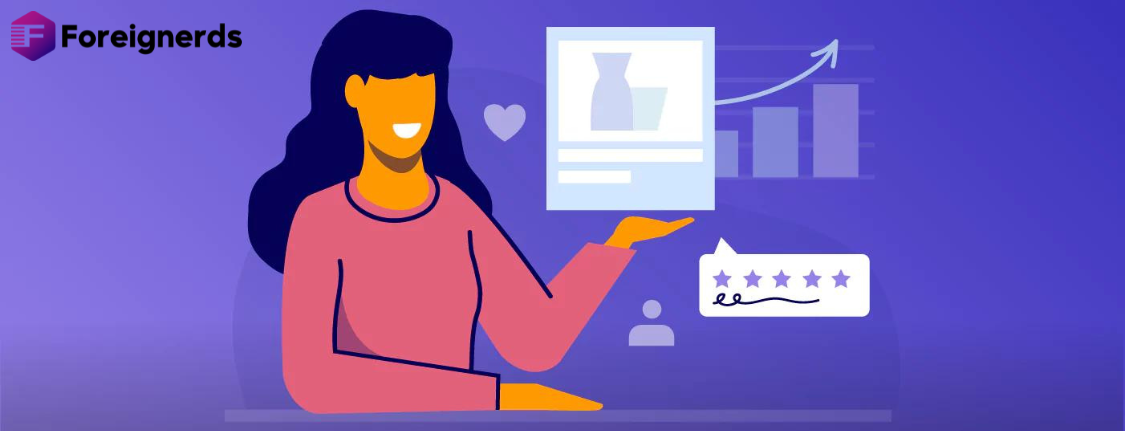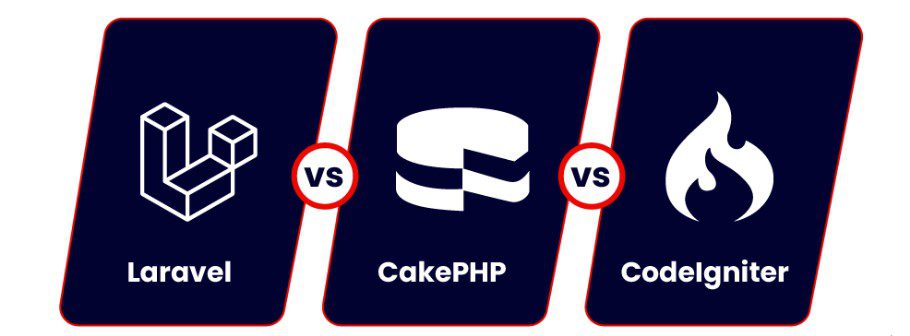- Home
- Website Development & Designing
- Laravel vs CakePHP vs CodeIgniter –...

In the ever-evolving landscape of web development, the choice of the right PHP framework is crucial for building robust and efficient solutions. Laravel, CakePHP, and CodeIgniter stand out as prominent players in the realm of PHP frameworks. Let’s delve into a comprehensive comparison to help you discover the best fit for your project.

Laravel vs CakePHP vs CodeIgniter
PHP, which stands for Hypertext Preprocessor, is a server-side scripting language that has played a crucial role in web development since its inception in 1994. Created by Rasmus Lerdorf, PHP was originally designed for maintaining his personal homepage but quickly evolved into a powerful tool for building dynamic web pages.
One of PHP’s enduring strengths lies in its versatility. It seamlessly integrates with HTML, making it easy to embed PHP code directly within HTML documents. This simplicity, combined with its open-source nature, contributed to PHP’s widespread adoption. Over the years, PHP has been a cornerstone for server-side scripting, powering countless websites and web applications.
PHP’s extensive community and rich ecosystem of libraries and frameworks further enhance its appeal. Frameworks like Laravel, Symfony, and CodeIgniter provide developers with structured methodologies for building scalable and maintainable applications. This robust support system has contributed to PHP’s resilience and continued relevance in the ever-evolving landscape of web development.
Moreover, PHP is renowned for its compatibility with various databases, including MySQL and PostgreSQL, making it a preferred choice for database-driven applications. Its ability to interact seamlessly with databases has been crucial in the development of content management systems (CMS) like WordPress, Joomla, and Drupal, all of which rely heavily on PHP.
Despite the emergence of newer programming languages and frameworks, PHP has endured due to its simplicity, ease of learning, and the vast amount of legacy code that continues to power many websites. Additionally, PHP has evolved with each version, introducing features and improvements to address modern development needs, such as better performance, security enhancements, and language enhancements.
A framework, essentially a set of web development tools, provides a structured foundation for building web applications or solutions. Think of it as a scaffold guiding developers in constructing a digital web or app solution.
Laravel emerges as the contemporary frontrunner among PHP frameworks. Embracing an open-source ethos, Laravel empowers developers to concentrate on core project fundamentals. Its agile development methodology has made it the preferred choice for businesses across scales.
Laravel boasts excellent dependency management, facilitating a deep understanding of the service container (IoC) functionality. This feature simplifies class dependency management, either by removing or injecting hard-coded courses.
The support for Eloquent ORM in Laravel enables efficient and effortless database interaction, enhancing overall development productivity.
Laravel streamlines authentication with a straightforward command, a stark contrast to the time-consuming efforts required in other PHP frameworks.
Laravel’s routing feature is intuitive, enabling the creation of restful applications with ease. Additionally, it provides flexibility in creating search engine-friendly URLs.
Laravel prioritizes security, employing BCrypt for SQL injection attack prevention and adopting measures to escape user entries, ensuring a secure web development environment.
CakePHP, operating under an MIT license, is a popular open-source PHP framework. Businesses worldwide opt for CakePHP due to its ability to facilitate the rapid development of robust solutions.
CakePHP adheres to the Model-View-Controller architecture, catering to modern programming requirements and providing developers with a novel approach to database modeling.
Critical for basic database functionalities, CakePHP’s CRUD scaffolding simplifies Create, Read, Update, and Delete operations, granting developers control over production dynamics.
The framework includes built-in validation features, enhancing entity flow, validation methods, and overall development ease.
CakePHP introduces a feature allowing easy modularization of apps, facilitating code reuse and the addition of new features to existing programs.
Operating on an Autodetect feature, CakePHP eliminates the need for additional configuration until specific fixing or installation becomes necessary.
CodeIgniter, another open-source PHP web framework, excels in modifying the Hierarchical Model–View–Controller (HMVC). Known for its speed and quick responsiveness, CodeIgniter is ideal for developing dynamic websites.
CodeIgniter facilitates the creation of robust web solutions with easy bug detection, ensuring smooth web operations.
Despite limited database support, CodeIgniter provides default relational databases like MySQL or PostgreSQL, along with its own ORM tool, offering developers various tools to streamline the development process.
CodeIgniter excels in creating engaging user interfaces, contributing to the development of attractive and powerful web solutions without compromising functionality.
The absence of a template engine allows most code to be written in PHP, enabling developers to build quick solutions efficiently and effortlessly.
CodeIgniter stands out as one of the most SEO-friendly PHP frameworks, alleviating concerns about digital marketing for businesses opting for PHP development services.
Choosing the right PHP framework involves considering several factors:
Understanding project requirements is essential. Basic needs may call for a different framework than custom development requirements.
Checking for the implementation of the Model-View-Controller design pattern ensures a solid framework.
Frameworks help reuse database access; choosing one that aligns with your requirements is crucial.
Caching is a potent tool for enhancing web performance. Selecting a framework that supports caching can significantly improve overall performance.
For secure outcomes, opt for a framework with a built-in authentication feature.
In the digital world, security is paramount. Choose a framework with robust mechanisms to ensure PHP solutions are safe from vulnerabilities.
Check for robust documentation and community support, facilitating a better learning curve and assistance when needed.
PHP, a programming language with a rich history, offers a plethora of frameworks, each with its own strengths and weaknesses. Choosing between Laravel, CakePHP, and CodeIgniter depends on project requirements, development preferences, and community support. If uncertainty persists in selecting the ideal framework, reaching out to a reputable web development company is a wise move. They can provide guidance based on expertise, reducing overhead costs and ensuring reliable and robust solutions.
© 2013 - 2025 Foreignerds. All Rights Reserved